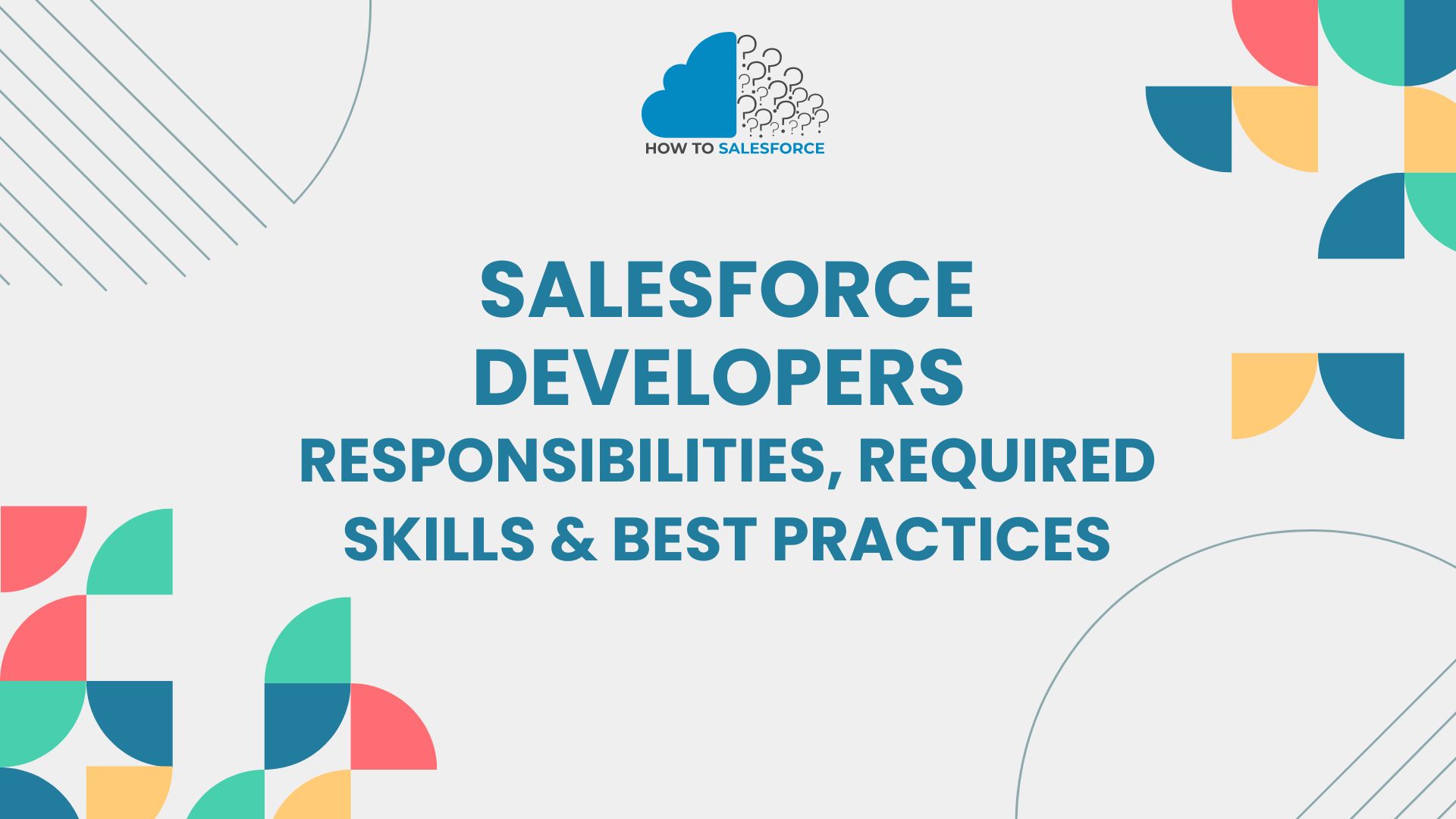Introduction
Salesforce developers are crucial because they enhance the platform’s flexibility, ensuring it meets the specific needs of each business. This blog provides an in-depth look at Salesforce developers, including their responsibilities, the skills required, and the best practices for performing their jobs.
Who Are Salesforce Developers?
Salesforce developers create unique Salesforce apps and solutions. They employ Salesforce products and technology to customize solutions that improve business processes, user experiences, and organizational productivity. These developers possess a deep understanding of Salesforce’s technical and commercial aspects, enabling them to provide exceptional solutions.
Key Characteristics of Salesforce Developers
- Technical Proficiency: Mastery of Salesforce’s proprietary languages and tools such as Apex, Visualforce, and Lightning Components.
- Problem-Solving Skills: Ability to analyze complex business requirements and translate them into effective technical solutions.
- Adaptability: Capability to stay updated with the latest Salesforce updates and trends.
- Collaboration: Working effectively with teams, including administrators, consultants, and stakeholders, to deliver successful projects.
Understanding the Salesforce Ecosystem
- Salesforce Platform: A comprehensive suite of tools and services for building and deploying customized business applications.
- Salesforce AppExchange: A marketplace for Salesforce apps and components that can extend the platform’s functionality.
- Trailhead: Salesforce’s free, gamified learning platform offering modules, projects, and trails for hands-on learning.
Roles and Responsibilities
Salesforce developers are responsible for many different tasks, all of which are essential to the smooth running and upkeep of Salesforce systems.
Custom Application Development
Developers make apps that are specific to the needs of a company. In this case:
- Apex Programming: Writing Apex code to create custom business logic.
- Visualforce Pages: Designing custom user interfaces using Visualforce.
- Lightning Components: Building dynamic web applications with Lightning Web Components (LWC).
- Heroku Integration: Using Heroku for app development that integrates with Salesforce, leveraging both platforms’ strengths.
System Integration
It is often necessary to integrate with other systems to ensure seamless data flow and smooth operations. Some of their duties are:
- API Integration: Using REST or SOAP APIs to integrate Salesforce with external systems.
- Middleware Solutions: Leveraging middleware platforms like MuleSoft to facilitate complex integrations.
- Data Synchronization: Ensuring data consistency across integrated systems.
- Event-Driven Architecture: Implementing event-driven integration using Platform Events and Change Data Capture (CDC) for real-time data updates.
Data Management
Keeping the accuracy and usefulness of Salesforce data up-to-date requires good data management:
- Data Modeling: Designing data models that accurately represent business processes.
- Data Migration: Migrating data from legacy systems to Salesforce.
- Data Quality: Implementing processes to maintain data accuracy and consistency.
- ETL Processes: Using Extract, Transform, Load (ETL) tools to manage data migration and integration tasks.
Automation
Salesforce developers are also responsible for automating business processes to ensure they run more smoothly.
- Workflow Rules: Setting up rules to automate standard internal procedures.
- Process Builder: Creating sophisticated, automated workflows to streamline complex business processes.
- Flow Builder: Developing advanced automation with Flow Builder for handling more complex scenarios.
- Apex Triggers: Writing Apex triggers to perform operations before or after database events.
Essential Skills for Salesforce Developers
You need both technical and soft skills to do well as a Salesforce engineer.
Technical Skills
- Apex: Proficiency in Apex programming for custom business logic and automation.
- Visualforce: Ability to create custom UIs using Visualforce.
- Lightning Web Components (LWC): Expertise in building modern web applications with LWC.
- SOQL and SOSL: Skills in Salesforce Object Query Language (SOQL) and Salesforce Object Search Language (SOSL) for data retrieval.
- API Knowledge: Understanding of REST and SOAP APIs for system integration.
- DevOps: Familiarity with DevOps practices for continuous integration and delivery.
- Heroku: Knowledge of using Heroku for building, running, and operating applications entirely in the cloud.
- JavaScript Frameworks: Proficiency in JavaScript frameworks such as Angular, React, or Vue.js for developing rich, client-side interfaces.
Soft Skills
- Problem-Solving: Analytical skills to solve complex business challenges.
- Communication: Ability to effectively communicate technical concepts to non-technical stakeholders.
- Project Management: Skills to manage development projects from conception to deployment.
- Collaboration: Ability to work collaboratively with other developers, administrators, and business analysts.
- Time Management: Efficiently managing time to meet project deadlines and deliver high-quality work.
Continual Learning and Adaptability
- Trailhead: Engaging with Trailhead modules and trails to keep skills sharp and stay updated with new features.
- Certifications: Earning and maintaining Salesforce certifications to demonstrate expertise and commitment to professional development.
- Community Involvement: Participating in the Salesforce community through forums, events, and user groups to share knowledge and learn from peers.
Tools and Technologies
A lot of different tools and technologies are used by Salesforce developers to build and manage Salesforce systems.
Salesforce Development Tools
- Salesforce Developer Console: A web-based integrated development environment (IDE) for writing and testing Apex, Visualforce, and Lightning Components.
- Salesforce CLI: Command-line interface for scripting and automating tasks.
- VS Code with Salesforce Extensions: Visual Studio Code with Salesforce extensions for a robust development environment.
- Sandbox: Development and testing environments that mirror production.
- Workbench: A suite of tools for exploring and interacting with Salesforce APIs.
Third-Party Tools
- MuleSoft: Integration platform for connecting Salesforce with other systems.
- Git: A version control system for managing code changes.
- Jenkins: An automation server for continuous integration and continuous deployment (CI/CD).
- JIRA: Project management tool for tracking development tasks and progress.
- Data Loader: Tool for bulk data import, export, and deletion.
Becoming a Salesforce Developer
Education and Certification
- Formal Education: A degree in computer science or related fields provides a strong foundation.
- Salesforce Certifications: Earning certifications like Salesforce Certified Platform Developer I and II validates your expertise.
- Platform Developer I: Covers fundamental programming and development skills.
- Platform Developer II: Focuses on advanced programming and development concepts.
- Other Certifications: Consider additional certifications like Salesforce Administrator or Salesforce Architect to broaden your expertise.
Gaining Experience
- Trailhead: Salesforce’s interactive learning platform offers hands-on experience.
- Real-World Projects: Engaging in real-world projects, internships, or contributing to open-source projects helps build practical skills.
- Networking: Joining the Salesforce community and attending events can provide valuable insights and opportunities.
- Mentorship: Seeking guidance from experienced Salesforce developers can accelerate learning and career growth.
- Personal Projects: Building personal projects or contributing to non-profit organizations using Salesforce can provide practical experience and showcase your skills.
Career Path and Growth Opportunities
- Junior Developer: Starting with entry-level development tasks under the guidance of senior developers.
- Mid-Level Developer: Taking on more complex projects and responsibilities, including system integration and custom app development.
- Senior Developer: Leading development projects, mentoring junior developers, and contributing to strategic decisions.
- Architect: Designing large-scale Salesforce solutions and overseeing technical implementation.
- Consultant: Advising clients on best practices and implementation strategies to maximize their Salesforce investment.
Best Practices for Salesforce Development
Following best practices makes sure that Salesforce products work well and can be maintained.
Code Quality
- Code Reviews: Regular code reviews to maintain high standards.
- Unit Testing: Writing comprehensive tests to ensure code reliability.
- Documentation: Thorough documentation for easier maintenance and onboarding.
- Modular Code: Writing modular, reusable code to enhance maintainability and scalability.
Performance Optimization
- Bulk Processing: Using bulk processing to handle large volumes of data efficiently.
- Governor Limits: Being mindful of Salesforce governor limits to avoid performance issues.
- Efficient Queries: Writing efficient SOQL and SOSL queries to minimize resource usage.
- Caching: Implementing caching strategies to reduce load times and improve performance.
Security
- Data Security: Implementing robust security measures to protect sensitive data.
- Access Control: Using profiles, roles, and permission sets to control user access.
- Encryption: Leveraging Salesforce Shield for encryption and enhanced data security.
- Compliance: Ensuring compliance with relevant regulations and standards, such as GDPR and HIPAA.
Continuous Learning
- Stay Updated: Keeping up with Salesforce releases and new features.
- Professional Development: Participating in training and earning advanced certifications.
- Community Engagement: Actively participating in the Salesforce community to share knowledge and learn from others.
- Innovation: Exploring new tools, technologies, and methodologies to continually improve development practices.
Common Challenges and How to Overcome Them
Navigating Salesforce Governor Limits
- Efficient Coding: Writing efficient code to stay within limits.
- Asynchronous Processing: Using asynchronous methods to handle long-running operations.
- Batch Processing: Implementing batch processing for large-scale data operations.
Managing Complex Integrations
- Clear Requirements: Defining clear integration requirements and objectives.
- Robust Testing: Performing thorough testing to ensure seamless integration.
- Error Handling: Implementing comprehensive error handling to manage integration failures gracefully.
Ensuring Data Quality
- Validation Rules: Implementing validation rules to maintain data integrity.
- Regular Audits: Conducting regular data audits to identify and correct issues.
- Data Cleaning: Using data cleaning tools and techniques to maintain high data quality.
Balancing Customization and Standardization
- Best Practices: Following Salesforce best practices to balance customization with standard functionality.
- Stakeholder Collaboration: Collaborating with stakeholders to align customization with business needs.
- Scalability: Designing solutions that can scale with the organization’s growth.
Staying Updated with Platform Changes
- Release Notes: Regularly reviewing Salesforce release notes to stay informed about new features and changes.
- Trailhead: Completing Trailhead modules on new releases and features.
- Community Engagement: Participating in Salesforce community events and discussions to learn from peers.
Conclusion
Salesforce developers are very important because they make sure that the platform is used to its fullest potential by making it fit the needs of each business. Salesforce developers can add a lot of value to a business by learning the right skills, following best practices, and keeping up with the latest news.
This complete guide on Salesforce developers gives you the ideas and information you need to do well in this fast-paced and gratifying job. Salesforce developers can come up with new ideas that change companies and make user experiences better if they have a strong base, are always learning, and are driven to do their best.


